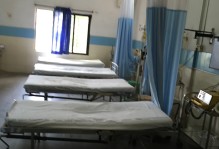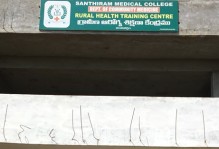Identifying a “Source of Hope” While Studying Economic Outcomes of Climate Change and Intergenerational Health Issues
By Madeline S. Helfer ’22
In the fall semester of 2019, Visiting Assistant Professor of Economics, Ranjan Shrestha, approached me with an opportunity. As a development and health economist, he was looking to open his research studying child stunting in Indonesia to the GRI faculty-led Summer Fellows program, and wanted to know if I was interested in applying. The program would entail a summer living in Jakarta and working with him at TN2PK, the poverty reduction agency of Indonesia. It was beyond anything I had ever pictured myself doing, and was widely outside of my comfort zone.
Naturally, I jumped at the opportunity to apply, and fortunately was accepted as a part of the Spring 2020 cohort. I dutifully added Indonesian to my Duolingo account and read all I could about the country, growing more excited for the summer with every new fact I learned.
Fate had other plans. COVID-19 hit, and slowly but surely it became clear that it was here to stay. The in-country portion of the program was suspended, but GRI offered me a place in the 2021 cohort. Professor Shrestha kindly mentored me informally in lieu of the program, and I gained valuable skills and learned more about the issue of stunting in the developing world. 2021 came, and with it new COVID-19 variants. After discussing options with Professor Shrestha, we decided to continue with the program remotely stateside.
While my kitchen table in central Pennsylvania was leagues away from where I thought I’d be, my time with the program was still an immensely valuable and rewarding experience. I assisted Professor Shrestha by compiling literature for two economic projects in the context of Indonesia.
One project concentrated on the impacts of female adolescent anemia. Through the literature I read for the project, I learned about the persistent and significant impacts nutrition can have on socioeconomic outcomes in the context of developing countries and beyond. The health economics literature has established robust occupational, income, and educational ramifications for individuals afflicted with poor health; however, more recent literature has demonstrated that such impacts persist across generations. The lowered income often experienced by parents in poor health has been shown to increase the likelihood of health insults for their children, which in turn threatens the child’s own future educational and occupational attainment and income. Thus poverty is transmitted intergenerationally through morbidity, and health becomes a major obstacle to economic development deserving of its attention in the development literature. Studying this area of the literature not only exposed me to highly refined econometric methodologies such as dynamic models, but also opened my eyes to the widespread and compounding nature of the effects of preventable health insults common to the developing world.
I was further exposed to these complexities while working on a literature review for the second project, which examined the impact of weather shocks on economic well-being in Indonesia. I combed through hundreds of citations to compile a written overview of 47 papers studying the impacts of climate on a wide range of economic variables. Through my research, I discovered how climate promises to impact the microeconomy through wages, health, labor productivity, and income, as well as the macroeconomy through agricultural yields, total factor productivity, and economic growth. While the debate is ongoing as to whether developed nations are mostly insulated from climate’s impacts, the vast majority of the literature predicts strongly disparate experiences between the developed and the developing world in the face of climate change — once again demonstrating the particular vulnerabilities and difficulties developing countries encounter.
Though the past year had many disappointments, my time with the GRI Summer Fellows program was certainly not one of them. Through my experiences working on both projects and the wonderful mentorship of Professor Shrestha, I grew immensely in my technical research skills and was exposed to a thriving, fascinating area of economic literature that has inspired me to pursue a career in development economics. Most importantly however, I obtained a better perspective of the unique challenges developing countries face. I feel that until now I had never fully grasped the astounding number of ways in which differences in national income lead to vastly different experiences of global issues such as climate change and human health, which is nothing short of a tragedy. Still, the ongoing rapid expansion of the development literature is a source of hope for eliminating the pervasive global inequity that causes so much suffering for millions across the world, and I am glad to have had the opportunity to take part in such meaningful work.




No comments.
Comments are currently closed. Comments are closed on all posts older than one year, and for those in our archive.